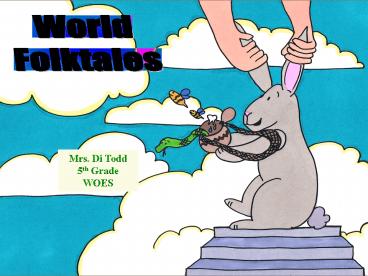The Language and Culture of Stories - PowerPoint PPT Presentation
Title:
The Language and Culture of Stories
Description:
Title: The Language and Culture of Stories Author: Herricks High School Last modified by: CCS Created Date: 10/25/1999 3:55:58 PM Document presentation format – PowerPoint PPT presentation
Number of Views:377
Avg rating:3.0/5.0
Title: The Language and Culture of Stories
1
World Folktales
Mrs. Di Todd 5th Grade WOES
2
World Folktales Project
Communication Working in pairs to Interpret a
world folktale by retelling your folktale in the
form of a newscast
Technology Develop a News Cast
report about your world folk tale
Cultures Gain knowledge and understanding of
other cultures
Communities Your news cast will
be video and place on our wiki page so you can
share your report will others
Connections Will be made from another country to
the United States through research.
3
21st Century Skills
- thinking critically
- solving complex,
multidisciplinary,
open-ended
problems - creativity
- entrepreneurial
thinking - innovative use
of knowledge, information
opportunities
4
WHY use folktales?
the great power of the story is that it engages
us affectively as well as requiring our cognitive
attention we learn the content of the story
while we are emotionally
engaged by its
characters or events. -
Kieran Egan, Teaching as Storytelling
5
WHY use folktales?
- The use of literature designed for children in
the target culture allows learners of the target - language to share
- cultural experiences
- and attitudes in a very
direct way
- Curtain and Pesola
- Languages and Children,
- Making the Match
6
WHY use folktales?
Through the characters on the page,
children are able to live out their worst fears
and their fondest wishes. Valuable life
lessons are conveyed through the stories
which children readily absorb in a non-
threatening and even
enjoyable context. -Bruno Bettelheim, The Uses
of Enchantment
7
WHY use folktales?
Children do not learn about complex
grammatical points by either making errors and
then being corrected or through explicit
instruction in grammar. The knowledge of
specific grammatical rules "...is
part of a child's biological
endow-
ment, part of the structure of the
language faculty. about 99 percent of
teaching is
making students feel
interested in the material. -Noam
Chomsky, Language and Problems of Knowing
8
With folktales you
will
won't
differentiate activities to meet the needs of diverse learners Require all students to interact in the same way with the material
teach grammar and vocabulary in context teach grammar and vocabulary in isolated lists
incorporate language, culture and content teach language separate from its cultural context
communicate with the classroom teacher to reinforce curriculum organize lessons on topics that are disconnected from the students
9
World Folktale Project
- Table partners will be your partner for this
project. - Working together you will retell your chosen
folktale. - Create a 3-5 minute news cast script to retell
the folktale.
- Together research your country to add information
to your news cast. - Develop a powerpoint to enhance your retelling
- Construct a quiz for your audience.
10
News Cast
- Develop, write and present the retelling of your
folktale. - Script needs to include the 5 Ws writing method.
- Script must include who is going to say what and
when they are to be said.
- News cast should be 3 to 5minutes long.
- Practice, Practice, and practice some more.
- Work on voice volume and facial expressions.
- Be PROUD of your work
11
Research of country
You are your audiences eyes to your country.
Please introduce your country to us. You will
need to find a map to show its location.
Introduce us to the culture of your country.
12
What to research
culture
content
Powerpoint
Interesting facts
Map and pictures
13
Illustrations kid art
14
Illustrations photo/drawing
15
Illustrations ClipArt
16
Special vocabulary
Specialized vocabulary el totumo
17
PRE-READING Story ordering using illustrations
18
PRE-READING Story background
- realia
- tradition
- author
- geography
- floor maps!
19
PRE-READING regions, biomes, environment, weather
20
Quiz Requirements
Factual questions
Vocabulary
Check for understanding
Opinion questions
Thought Question
21
- (Barton and Booth,
- Stories in the Classroom, 1990)
- Stories allow students to anticipate and predict
thus involving them in activity.
22
POST-READING Comprehension check
Factual questions What did the rabbit want? How
did he get it? Opinion questions Do you think
that the rabbit was right do trick the
animals? Related personal questions Have you
ever tricked anyone? Have you ever wanted to
change something
about yourself?
23
READING Skits TPRS Videos Puppet Shows
24
- Stories are everywhere
Go out and find them!
25
Questions?
Comments?
Ideas?































